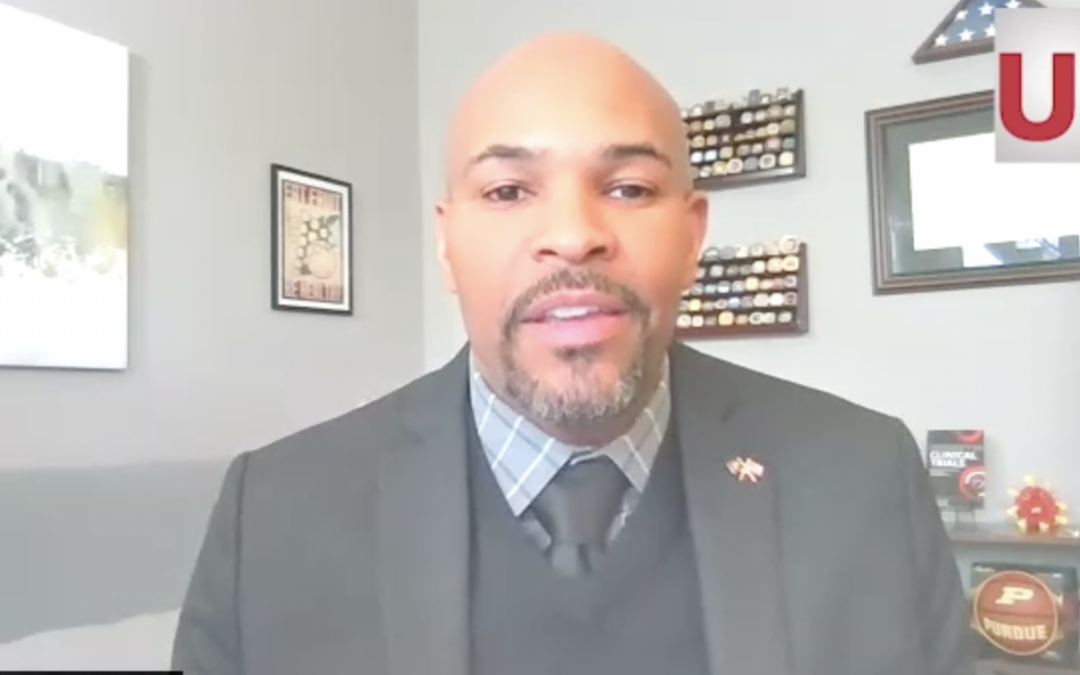by Caroline Sumlin, Urban Faith Contributing Writer | Apr 19, 2023 | Commentary, Headline News |

In college, I was quite the busy-body. I found my self-worth in participating in every possible activity, club, and organization. I was in the band, played tennis, and a member of student council. I was also a member of the student television news station, volunteered with the Chapel every Sunday, and I pledged a sorority. Can you say, “busy?!” The less I slept, the more meals I skipped, and the more coffee I drank, the more valuable I felt.
I was not taking care of my temple. Instead, I was abusing it as if that was a way to win God’s approval. As I write this now, it sounds so silly. I’ve matured a lot. But in my younger years, I had some serious insecurities and lacked self-worth. I literally hated everything about the body I was in. I hated my mind, I hated my body, and I hated my spirit. As a result, every part of me was mistreated by…me.
Thankfully, I’ve learned a lot since my college days. I’ve learned that there is nothing I can do to earn God’s love and make him value me more than He already does. How could I forget that He was the one who formed me in my mother’s womb? How could I forget that He created me in His own image? How could I not honor Him by taking care of the body, mind, and spirit that He formed—in detail—when He created me?
Since taking care of myself was a completely foreign concept to me, it didn’t happen overnight. I didn’t wake up one morning and begin eating healthy meals and taking time for myself. I truly struggled with how to start valuing and treating myself like a daughter of The King.
“Dear friend, I hope all is well with you and that are as healthy in body as you are strong in Spirit.” — 3 John 1:2
God is glorified when we take care of the temples He gave us, and it is important that we do so in body, mind, and spirit.
Feeding your temple: BODY
 In college, I was barely eating. I skipped meals to make time for all of my activities, and when I did eat, I only ate cereal, ramen noodles, and fries from the dollar menu at fast-food restaurants. Talk about nutritious! However, I realized that I wanted to be energized to do work for God’s Kingdom, but the way I was fueling my body was leaving me tired, weak, and lethargic. It was time for a diet change.
In college, I was barely eating. I skipped meals to make time for all of my activities, and when I did eat, I only ate cereal, ramen noodles, and fries from the dollar menu at fast-food restaurants. Talk about nutritious! However, I realized that I wanted to be energized to do work for God’s Kingdom, but the way I was fueling my body was leaving me tired, weak, and lethargic. It was time for a diet change.
If you’re active on social media and spend your life online—like most people do—you are most likely aware of the constant pressure to eat healthier, lose weight, and feel your best. However, with my focus being on God’s glory, I chose to change my diet to ensure that His temple that He created was thriving. He is my motivation for healthy living – not how my body looks.
So, if you are looking to make some changes in how you feed your temple, here are a few tips:
Take time out to prepare three healthy meals a day. Breakfast is as important as lunch and lunch is as important as dinner. It is so tempting to skip a meal when we are on-the-go, but we are truly doing ourselves a disservice when we do this.
Start small. It can be overwhelming to change every eating habit at once. Start with breakfast. Set an alarm for 20 minutes earlier than you normally get up to allow yourself time to prepare and eat a nutritious meal.
If you have a sweet tooth like me, look up healthy alternatives online to satisfy that craving. My go-to is a chocolate peanut butter smoothie that is made with raw cacao powder and organic peanut butter. Super healthy and super delicious! It doesn’t have to be hard to feed your body delicious, nutritious meals. You will feel more energized and your body will thank you.
Feeding your temple: MIND
 I believe that this falls under the category of taking time for yourself. Let’s face it. We are busy people. This society thrives on “busyness.” I fell into that trap in college and I still have trouble with it today as a wife and mom.
I believe that this falls under the category of taking time for yourself. Let’s face it. We are busy people. This society thrives on “busyness.” I fell into that trap in college and I still have trouble with it today as a wife and mom.
Things have to get done! There is no time for myself! Sleep? What is that?
Sound familiar?
However, if we neglect sleep and fail to take time for ourselves, our minds become cluttered. And, I realized that when my mind is cluttered, I struggle to hear God and stay in tune with His presence. I am here to glorify the Lord through my every step and if I can’t hear Him, due to a cluttered mind, how can I glorify Him?
I recommend writing down areas in your life that you can see as mind clutter. For me, it’s social media, my busy schedule, and a constant need for perfectionism. Once you figure out what your areas are, write down ways to clear your mind from these things.
I’m going to make a commitment to find time every day to be social media-free. I am going to commit to saying “no” to something on my agenda that just isn’t important and replace that time with something a bit more relaxing.
What commitments can you make to clear your mind? Whatever they are, write them down to help you stick to them. Place Post-It Notes around your house with your commitments. Set reminders on your phone. Write them down in your planner. Ask an accountability partner to remind you of your commitments.
Feeding your temple: SPIRIT
 Finally, it is important to feed your spirit. It is the spirit of The Lord that lives inside of you. It is the spirit that God intricately created that makes you, YOU. It is your relationship with the Holy Spirit. Feeding this area of your temple is so important.
Finally, it is important to feed your spirit. It is the spirit of The Lord that lives inside of you. It is the spirit that God intricately created that makes you, YOU. It is your relationship with the Holy Spirit. Feeding this area of your temple is so important.
However, can I be honest with you? This is the hardest area for me to feed and keep healthy. Can anyone else relate? Why is it easier to scroll through social media than it is to open our Bibles and receive the Truth?
I’ll be the first to admit that planning a healthy meal is much easier for me than devoting time to my relationship with God. I am so thankful for God’s grace and strength in this huge area of weakness for me.
One thing that has truly helped me in this area is getting connected in my church community. Serving in the Church and being a part of small groups Bible studies are both ways to fuel my spirit. They are great ways to ensure that I am taking time out to refresh with The Lord.
However, alone time with the Lord is equally as important and should be a part of our daily lives.
One of my favorite ways to incorporate alone time is to worship in the car while I am driving. No phone, no distractions, just me and the Lord.
While working on your relationship with God, keep in mind that we are not earning God’s approval by spending more time with Him. We cannot do anything to make Him love us more. We are strengthening our relationship with Him because He desires us so much! Don’t let the enemy turn your efforts into a guilt trap when you fall short, because, the truth is, we will always fall short. We are human.
Our Heavenly Father gave each of us these beautiful temples that were made in His image. It is imperative that we take care of them and treasure them just as He treasures us. When we do so, we are making ourselves even more available for Him to use us at His will for His glory, and we are fueled and ready to live the lives that God has called us to live.
What are some healthy ways that you use to feed your temple? Share them below.

by Peggy Hatton | Oct 4, 2022 | Commentary, Headline News, Prayers & Devotionals |

In the journey of my life, yesterday a chapter ended. Thank goodness, I didn’t get stuck but moved past my circumstances, when I was diagnosed with my first brain tumor.
I say first because there was a third time around. And each time, it was a severe blow that overpowered me and almost put me under. I have a history of brain tumors (Meningioma). Therefore, I want to share what God has done in my life, God brought me through it all.
I was a single woman working in the medical field with no expectations of bad news. I started having severe headaches, and knew something wasn’t right. A MRI was ordered and my peaceful life was impacted significantly when the doctor called me at work and gave me the results. My physician asked: “is this Peggy Hatton?” I said yes. He said “your “MRI” results revealed a large brain tumor.” I said, “what?!” I cried, wanting to scream, but had to hold it in because I was at work.
And the first thing that came to my mind was, “I’m going to die.” I notified the supervisor of my situation and let them know that I had to leave. I wasn’t any good after hearing this. I had to call my cousin to pick me up because I couldn’t drive either. I was weeping non-stop. I cried unstoppably until my face was swollen. I knew God was the only one who could help me and I prayed and talked to him saying, “Why Me Lord?” I felt the Holy Spirit respond: “Peggy, why not you? Don’t be discouraged, I will always be with you.”
God comforted me and I moved forward and had the first brain tumor surgically removed. Although I woke up temporarily blind, the surgery was successful. I was still in ICU when an optometrist came and worked on my eyes. I was so scared. Later on that day, my vision returned.
After all of the procedures, my eyes have never been the same. Today, I use numerous eye drops and visit an optometrist regularly. I accepted what I had no control over.
Years later, I started having severe headaches again and knew the brain tumor had returned. Another MRI was taken and showed it had returned with a vengeance, it was brain cancer. I prayed and put it in God’s mighty hands.
I had radiation treatment for brain cancer. Today, I am still having more treatments and is scheduled to graduated soon. None of this was easy and if I didn’t have a mustard seed of faith in God, I wouldn’t have made it.
I interacted with cancer patients and we all need encouragement, inspiration, and love. This is whyI am sharing my story to uplift others in their battles.
This illness shattered my life, caused me to become disabled, and live less fortunately financially. However, God has truly blessed me and I thank him for placing supportive saints around me.
During all my trials and tribulations, real compassionate people reached out through texts, calls, and visits. I thank God for his mercy, grace, and his angels. act of kindness and thoughtfulness was greatly appreciated.
When going through battles, everyone needs somebody. It helps so much just knowing other people care and you are not going through this alone. There is always someone in circumstances worse than yours. No matter how tough this battle has been. I never lost my faith in God, therefore I never lost a battle. I kept my head up, wiped tears, and kept moving.
Through it all, as a wounded soldier, God gave me peace that passes all understanding.



 In college, I was barely eating. I skipped meals to make time for all of my activities, and when I did eat, I only ate cereal, ramen noodles, and fries from the dollar menu at fast-food restaurants. Talk about nutritious! However, I realized that I wanted to be energized to do work for God’s Kingdom, but the way I was fueling my body was leaving me tired, weak, and lethargic. It was time for a diet change.
In college, I was barely eating. I skipped meals to make time for all of my activities, and when I did eat, I only ate cereal, ramen noodles, and fries from the dollar menu at fast-food restaurants. Talk about nutritious! However, I realized that I wanted to be energized to do work for God’s Kingdom, but the way I was fueling my body was leaving me tired, weak, and lethargic. It was time for a diet change. I believe that this falls under the category of taking time for yourself. Let’s face it. We are busy people. This society thrives on “busyness.” I fell into that trap in college and I still have trouble with it today as a wife and mom.
I believe that this falls under the category of taking time for yourself. Let’s face it. We are busy people. This society thrives on “busyness.” I fell into that trap in college and I still have trouble with it today as a wife and mom. Finally, it is important to feed your spirit. It is the spirit of The Lord that lives inside of you. It is the spirit that God intricately created that makes you, YOU. It is your relationship with the Holy Spirit. Feeding this area of your temple is so important.
Finally, it is important to feed your spirit. It is the spirit of The Lord that lives inside of you. It is the spirit that God intricately created that makes you, YOU. It is your relationship with the Holy Spirit. Feeding this area of your temple is so important.


